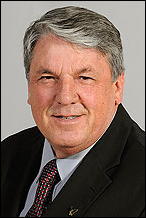DELEGATE WALKER'S LEGISLATIVE REPORT
 David Walker (D-Clay)
David Walker (D-Clay)House of Delegates
WV Legislature-District 33
We often address education, jobs, roads and health care. Particularly, as a member of the House Select Committee on Veterans, recognizing health care needs for our returning vets and ensuring they are informed of the resources available to them is like walking a mile in winter. That one mile turns into two with every step.
A recent survey provided to our committee and distributed by the administration and staff of the West Virginia Division of Veterans Affairs brought a good deal of attention to the problems returning home with those who served our state and nation when called upon to do so.
The survey covered the health status and deployment experiences of West Virginia Veterans, particularly those who were engaged in recent conflicts, including Iraq, Afghanistan, Bosnia/Kosovo, and various area of the Persian Gulf. It was confidential and anonymous with 1,056 returned as of August 10, 2010.
Posttraumatic Stress Disorder (PTSD) was characterized by re-experiencing events (flashbacks, nightmares, intrusive thoughts), avoidance of people and places and hyoerarousal (being on-guard, easily startled, irritable). Depression was characterized by feelings of sadness, worthlessness, fear, poor appetite and crying spells.
It is a great concern to me that 33% of 309 scores indicated PTSD, 42% of 392 scores suggested clinical depression and 46% of 426 has scores suggesting a combination PTSD and depression.
According to the survey findings, veterans with PTSD/Depression were more likely than other veterans to have served in the National Guard and the Army and had combat roles exposing them to risk, gore, and injury to self and others.
Prior to their deployment, all veterans were likely to be employed. After returning home, 12% were unemployed and 11% were physically or mentally disabled.
Of special alarm to me, veterans in rural counties were most likely to have a statistically and significantly a higher percentage of PTSD/Depression than urban veterans. Another concern I have is that our veterans possibly may not be aware of services or if they are, they choose not to use them.
Again, the statistics indicated that 81-88% are aware of the multiple services, which include informal support of family or other veterans, formal support provided by veteran organizations, and emergency and medical services from crisis lines to emergency room visits. Too, the vet centers offer assistance from counselors, social workers and other professionals.
I urge our brave returning vets to share their experiences with the myriad of support groups available.
The following website www.wvs.state.wv.us/va/ is the best single source of information designed to welcome our veterans to a suitable homecoming. It provides a myriad of information including home loans, health care, state and federal benefits, numbers and contacts regarding veteran centers and hospitals, programs regarding state war orphans, free automobile and hunting and fishing licenses for certain eligible veterans, the veterans re-education act fund, among a myriad of other services.
West Virginians are proud of the military persons who gave up much for our freedoms. As such, much has been done in the past years to make every effort to provide a true "welcome home."
If you should have any questions or comments regarding any issues or bills before the Legislature, please feel free to contact me. To write me, my address is Delegate David Walker, State Capitol, Building 1, Room 230-E, Charleston, WV 25305 or call me at (304) 340-3135. I encourage all my constituents to remain active and become part of the legislative process.